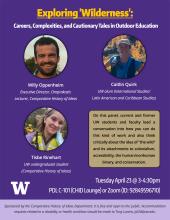Time: Tuesday April 23, 3-4:30pm
Place: PDL C-101(CHID Lounge) and Zoom
Could life after UW mean getting paid to lead hikes, learn from nature, or go trekking in the Andes? How might we conceptualize the outdoors as a space for personal and political renewal and liberation? At the same time, how might a career in “outdoor education” — and the very notion of "wilderness" — risk reproducing the logics of settler colonialism in which certain kinds of humans get privileged access to other peoples' lands? Is there a way to think about global and ethical forms of environmental learning without feeding “the rock-climbing Industrial complex”? On this panel, current and former UW students and faculty lead a conversation into how you can do this kind of work and also think critically about the idea of "the wild" and its attachments to colonialism, accessibility, the human/nonhuman binary, and conservation.
Panelists:
Willy Oppenheim, Executive Director, Omprakash; Lecturer, Comparative History of Ideas
Willy Oppenheim has worked in classrooms in the United States, India, Pakistan, and China, and in the wilderness as a faculty member at the National Outdoor Leadership School. He lives in Seattle and teaches intermittently at the University of Washington alongside his ongoing leadership of Omprakash (www.omprakash.org), a social enterprise that works to facilitate relationships, dialogue, and learning between change agents around the world.
Caitlin Quirk, UW alum (International Studies/Latin American and Caribbean Studies)
Caitlin will be pursuing a Masters of Environmental Humanities in the Fall and is a lifelong student of the natural world. After graduating from UW, she spent a year hiking long-distance trails around the world and working in the outdoor industry. She is passionate about cultural land practices and helping people play outside.
Tisbe Rinehart, UW undergraduate student (Comparative History of Ideas)
Tisbe Rinehart is a senior at UW majoring in Comparative History of Ideas. They just finished writing a book on the settler colonial violence within Wilderness Therapy, an institution in the Troubled Teen Industry that uses outdoor adventure as a therapeutic tool. She is also an outdoor guide at UW’s UWild Outdoor Education Program.
This event is sponsored by the Comparative History of Ideas Department; it is free and open to the public. Accommodation requests related to a disability or health condition should be made to Tony Lucero, jal26@uw.edu.
